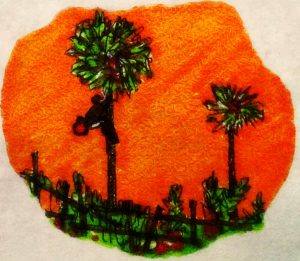FS: Book 1 – Chapter 6
 New born winter brought in fresh fragrance from the colorful blossoms. The villagers got busy sowing and reaping grains. From morning to night the whole village could feel joy and peace in the air. The scent of fresh jaggery being brewed filled every garden that had date palm trees. Naba, the farmer had started extracting milk from the cows from 4 AM morning, before the sun was up. His son Hari had started collecting date juice very early. The previous day he had climbed the palm tree, cut an edge from the stem, and tied a mud pot around the bark with a thick rope. The juice dripped all night into the pot. And the early next morning Hari and more farmers had climbed hundreds of trees and got down their pots. Sweet smell of date juice filled the village. The men enjoyed drinking glasses of the juice at a shot. The remaining juice was boiled hard to create jaggery.
New born winter brought in fresh fragrance from the colorful blossoms. The villagers got busy sowing and reaping grains. From morning to night the whole village could feel joy and peace in the air. The scent of fresh jaggery being brewed filled every garden that had date palm trees. Naba, the farmer had started extracting milk from the cows from 4 AM morning, before the sun was up. His son Hari had started collecting date juice very early. The previous day he had climbed the palm tree, cut an edge from the stem, and tied a mud pot around the bark with a thick rope. The juice dripped all night into the pot. And the early next morning Hari and more farmers had climbed hundreds of trees and got down their pots. Sweet smell of date juice filled the village. The men enjoyed drinking glasses of the juice at a shot. The remaining juice was boiled hard to create jaggery.
Dozes of jaggery pots were arranged in the balcony of Rai’s house. In the evening the ladies of the household would send them across in lots to the homes of their neighbors, relatives and friends. That day Kalo was skipping in the balcony enjoying the warm sun rays that made patterns through the windows on the floor, when accidentally her right foot touched one of the jaggery pots. The pot swayed ominously back and forth for a moment when Kalo’s heart had halted beating, spilled a bit of the more liquid jaggery before it became stable, still echoing the sound of friction across the balcony. For a few seconds the whole place was silent, all eyes bulging at the restless pot; after which all hell broke loose. Daughter-in-law of the house, how could Kalo be so careless? Hasn’t her parents taught her how to walk, how to behave? Hasn’t she learnt from her in-laws how to handle situations, to be sincere and responsible about her duties? A woman should be more in control, more reserved. Just because she has not seen poverty in the family doesn’t mean she can go around breaking things and wasting food. On and on they went.
Kalo stood there numb and helpless. She wasn’t sure what to do, how to amend the situation. And she was scared and nervous. Moving silently to a corner of the room, Kalo hung her head and continued chewing the end of her saree as she patiently tolerated every criticism hurled at her. Hot tears stung her eyes and rolled down her cheeks. Kalo was not used to so much hatred, sharp words, and negative talks. The people who were speaking were mostly elderly relatives who had to come to visit for a few days. From a significant distance Kalo’s mother-in-law stood and listened to everything that was being said, didn’t say word, and left the spot after some time. This hurt Kalo even more. That was the one person she thought would root for her.
Kalo knew she did not have to clean up the spilt jaggery from the floor. There were people who did that work and were paid for it at the Rai household. Lately Kalo had got silent and a little lonely. Her playmates don’t have time for her any more. Gauri is now the mother of two toddlers, and lives at her in-laws most of the time. Buri likes to pray and chant hymns most of the time, she prefers staying in the prayer room all day. Kalo’s mother-in-law gives her pieces of work through the day, and Kalo silently executes them. Her husband’s sister-in-laws have tried to pull her by her her saree a few times before and urged her to play, but she simply shakes her head and says ‘Í got work’. Kalo’s life from a couple of years back seemed to be a distant dream. She can hardly relate to her life this day. Something had happened in between that Kalo couldn’t identify. Something had broke the nostalgic rhythm.
That day Kalo sat with the other wives of the household to bake home-made desserts called ‘pithe’. They grind and scooped out a few coconuts, crushed and blended rice and grains. A big wooden heavy plank with a funny lever system was used to grind the rice. Women had to stand on the free end of the wooden plank, hold its outstretched handles and push it down again and again while at the other end her helper would keep pouring huge amounts of rice grains that got crushed minutely within the large hole that the heavy plank had created. Working on this plank gave Kalo an exquisite joy. She enjoyed watching the peasant wives work on it, and herself liked to jump on the plank when no one was watching. One of the peasant wives, Kalo’s friend Mani had once spotted Kalo jumping on the plank. She had laughed her heart out, and secretly tried to help her learn how to do it. But Kalo being the skinny girl, didn’t have the strength to push down the plank with her foot and always ended up jumping on it. Mani on the other hand was chubby and strong. To Kalo’s awe she made the job look so easy that she could even laugh and talk with Kalo while on it. Kalo grew rather fond of these peasant wives. This was the time the rest of the people in Rai household took rest, and Kalo was free to dance around with the other ladies at work.
One day Mani brought a white pigeon and gifted to Kalo as a pet. Kalo was very careful when she took over the tiny fragile creature and started petting it softly. The spotless white soft feathery bird let out a deep soothing sound as Kalo stared at it. She let her hands a little loose and the pigeon jumped off to the ground and started pecking at the grains. Within a few days the whole lawn of Rai household was filled with scores of pigeons pecking at grains littered. These birds were all local, and stayed in the ventilators of old houses and abandoned asbestos rooftops. The village never lacked food, especially in the winters. Rice, wheat, mustard, potatoes, cauliflowers, and various vegetables were grown in almost every field, and the village had lots of fields. Villagers were always busy reaping and cleaning and drying the grains, so naturally the birds always had a feast in the neighborhood on the husk and leftovers.
